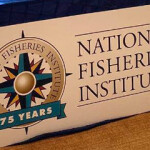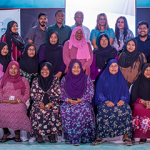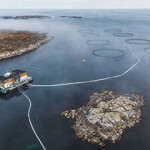Hilton signs MoU with Seafood Legacy and UMITO Partners on procuring sustainable seafood

Hotel and hospitality chain Hilton has signed a memorandum of understanding that will see it purchase more Marine Stewardship Council- and Aquaculture Stewardship Council-certified sustainable seafood.
Hilton Vice President of Operations for Japan, South Korea, and Micronesia Timothy Soper; Seafood Legacy CEO Wakao Hanaoka; and UMITO Partners’ Shunji Murakami, signed the MoU at a ceremony at Hilton Tokyo Bay on 27 October. The MoU will also see Hilton share product information about the fishery improvement projects and aquaculture improvement projects with which UMITO Partners and Seafood Legacy are involved.
“Hilton is committed to cutting its environmental footprint in half by 2030,” Soper said. “Our goals relate to a 25 percent procurement of seafood from sustainable sources by the end of 2022 from fisheries and farms certified by MSC and ASC and ensuring that the remaining volumes are on WWF green lists, or are procured from sources working towards certification and sustainable improvements – and we continue to make great progress towards this global objective at all of our hotels across the Japan, Korea and Micronesia region.”
Hilton has a portfolio of 18 global brands. In Japan, these include the Conrad Hotels and Resorts, Hilton Hotels and Resorts, DoubleTree by Hilton, Curio Collection by Hilton, and LXR Hotels. This year, the Tokyo Bay Hilton acquired MSC and ASC chain of custody certification.
Seafood Legacy provides sustainable seafood consulting and platforming services to Japanese seafood businesses and government.
"Excessive fishing that exceeds the pace of reproduction of marine ecosystems is a serious challenge for the international community with increasing global food demand. Selective procurement of sustainable seafood by companies is an effective solution,” Hanaoka said in a press release following the ceremony.
UMITO Partners, created earlier this year, is a consulting company that advises on fishery science and management, economic and financial sustainability, and community design for sustainability.
"These days, when even more [U.N. Sustainable Development Goals] efforts are required, we are focusing not only on corporate profitability but also on reducing social and environmental impacts. There is a need find a balance between doing business and solving social issues,” Murakami said. “Through such partnerships, I look forward to making a big contribution to the sea and fishermen and local sustainability.”
Photo courtesy of courtesy of Seafood Legacy






Share